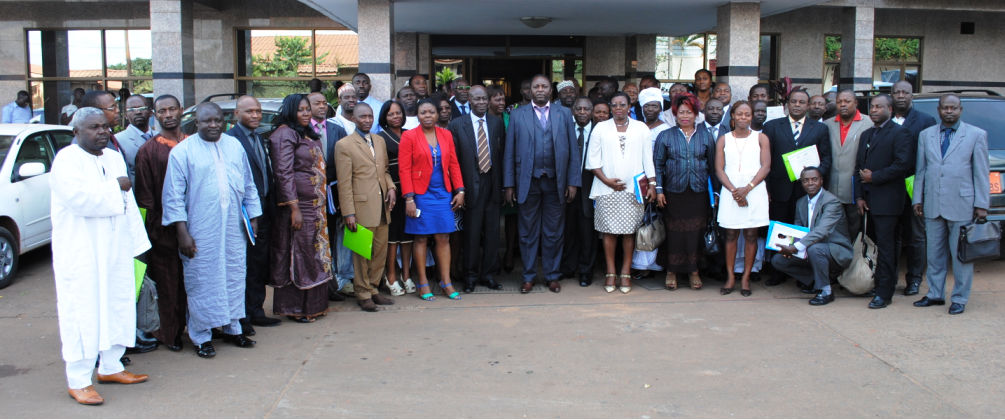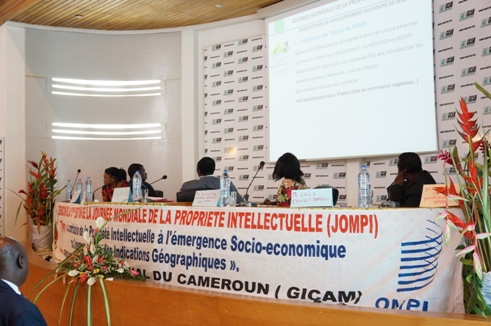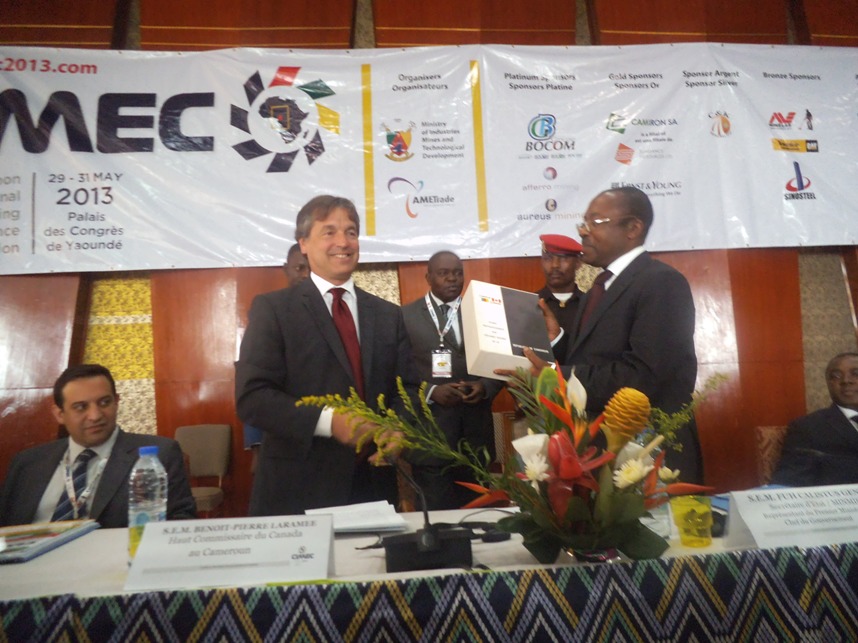MINISTRY OF MINES, INDUSTRY AND
TECHNOLOGICAL DEVELOPMENT
Headquaters:
Ministerial building (immeuble rose) - Yaounde
Tel : +237 681 129 081
E-mail : [email protected]
The news
Diary and ServicesDocuments-DownloadsMultimediaUseful LinksVisites count1966332
Today Yesterday This Week Last Week This Month Last Month All days 3663 4056 10561 1924620 81528 122926 1966332 Guest on lineWe have 42 guests and no members online |
Activities of the Division of Quality DevelopmentELABORATION OF THE STANDARDISATION INSPECTION MANUAL This activity is a component of actions designed to promote and develop standards and quality, as part of the promotion and development programme for improving competitiveness in Cameroon’s industrial productive sectors. Government’s decisions to reorganise the industrial sector as well as to protect the consumers may be influenced by a certain number of factors such as the unexpected arrival of new actors, the development of the informal sector, forgery, smuggling, innovation as well as the demands and expectations of customers and other stakeholders. Because of such factors of change, the State must put at the disposal of the industrial sector the required standards and the assessment mechanisms for these standards. Hence the need for an inspection guide for standardisation. Two major objectives are to be retained in this process: Administrative inspections with respect to standardization target offline and online assessment of compliance to standards which are made mandatory to firms producing goods and services in the national territory. These inspections also target the promotion and extension of the quality approach in the industrial sector in Cameroon.
It is financed by the European Union. In Cameroon, it arises from a plea of Cameroon Task Force Horticole, aiming to reinforce Food Health Security for products consumed both locally, regionally and internationally and to make them as competitive as those imported from developed countries on the International market. The programme takes into account the realities and the specific needs of the country concerned. The implementation of the plan of action will depend on Cameroon as it requires a participative approach from all the stakeholders concerned. The intervention strategy for the implementation of the SSA is based on three major components: • Risk management; • Communication on risk (governance) Presently, the programme is concerned only with Coffee, Fruits and Vegetables, but will extend to other foodstuffs. Stakeholders involved in this project include public services with supervisory and managerial duties, private operators as concerns self-supervision, independent experts for scientific advice and validation and finally service providers for capacity building. The main objective of this programme is to support Food Health Security Systems in ACP countries (African-Caribbean-Pacific), hence its close links with the CNCOSAC. • Assuring European Authorities on the quality of Health and Phytosanitary inspections (HPS) for products in their countries of origin, • Encouraging the application of the risk analysis approach in supporting stakeholders’ action in the system: risk assessment, management and information, • Facilitating the flow of information on transparency, independence (credibility) and continuous improvement in FHS system management. Expected results include the following: • The actual support of the country to restructuring its FHS system and a marked improvement in the various parts of the system taken into account by the programme. • The production by Cameroon of more reliable products to increase the volume of its exports in the main industrial sectors targeted by this project. • The actual provision of infrastructure and necessary approach for the initial experience to be extended to other sectors of the agro-food industry.) The following are the main activities which have been initiated since the beginning of the project • Assessment of the body of official supervision services; • structuring of an independent risk assessment system; • Training to the ISO 17020 standard (official control services); • Elaboration of a self-checking industry guide for the coffee sector; • An operator recording system and database (fruits and vegetables sector); • Support to test stations and assay offices; • Setting up of a national information system FHS; • Support to professional corporations • Capacity building of consumer associations TECHNICAL COOPERATION PROGRAMME ON CAPACITY BUILDING OF NATIONAL BUREAUS AND CODEX CONTACT POINTS IN THREE COUNTRIES: CAMEROON, GABON, AND CENTRAL AFRICAN REPUBLIC
• Encouraging the participation of all African countries in Codex Alimentarius activities, • Encouraging the capacity building of Codex Alimentarius National Committees in member countries of the region, • Encouraging the use by member states, of Codex Standards and related texts with a view to improving Food Health Security in the African region. This project covers the entire Central African sub-region, which in itself forms an integral part of the African region. The countries involved in this first phase of the project thus include Cameroon, the Central African Republic and Gabon. This is justified by the present low involvement of countries of the sub-region in the Codex Alimentarius activities and the non-implementation of Codex standards in national laws and regulations. In fact, in Central Africa, some countries like Cameroon and Gabon which had already benefited from support in terms of the capacity building of Codex stakeholders, participate in Codex activities in terms both of quantity (the number of international meetings attended by the countries ), and quality (quality of presentations and informational inputs during meetings). For other countries which have not yet benefited from such a support, the level of participation is low and inefficient. It is therefore necessary to improve on the participation level of all the countries in the Central African Sub-region in Codex Alimentarius Activities and to encourage the exchange of experience and points of view on issues being discussed within the Codex. The overall goal is the human and infrastructural capacity building of national committees and Codex contact points in all the countries of the Central African Sub-region. Specific objectives include: • helping countries to better organise the National Committees and Codex contact points, in terms of organization of activities, modification of regulatory texts and actual operation of the structures involved. • Encouraging countries to apply Codex Alimentarius standards and related texts in the national laws and regulations, within operational practices in food industries and in food inspection and control procedures. The outcome or expected results include: • Better application of Codex Standards and related texts at national level; • Actual coaching of countries in restructuring and setting up of national committees and Codex contact points, and preparing, participating and effective monitoring of some Codex meetings; • Effective support to countries in the implementation of Codex standards and related texts; • Actual availability of necessary infrastructure for Codex activities (computers, internet connection, photocopy machines, websites, video projectors and fax machines) Main activities include: • Support to countries in restructuring, organizing and setting up national committees and Codex Alimentarius contact points; • Support activities to countries in the implementation of Codex standards and related texts; • Activities Including purchasing and installing necessary equipments for the activities (computers, printers, internet connection, photocopy machines, websites, video projectors, fax machines etc…) and the training stakeholders on the use of these equipments. • Drafting legislative and regulatory texts, manuals and internal working guides. • Experience exchange activities between countries. |
Copyright 2013. All rights reserved. Designed, managed and moderated by CITYEYE












